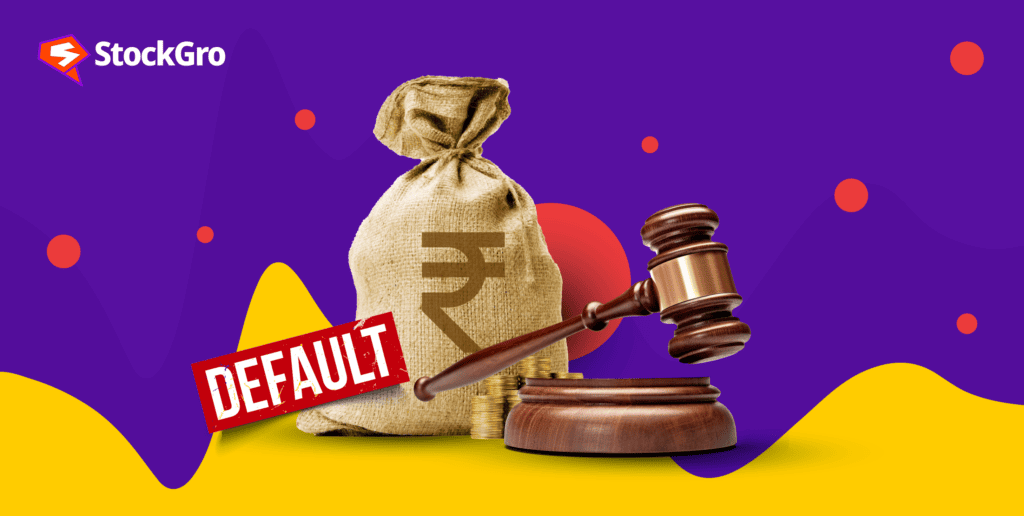
As a consequence of the COVID-19 pandemic and falling household savings, many Indians have turned to unsecured retail loans like credit cards and personal loans to cover their expenses. These loans have grown at a quicker pace than the overall credit in the system, surpassing it by 23% per year over the last five years, according to UBS.
Borrowers in India often fall into the trap of personal loan default when they miss a payment or are not able to repay the loan when due. Significant legal ramifications in India are triggered by this situation, which affects the defaulter’s financial and legal status.
This article will explore these consequences and their implications for people who fail to pay their bills.
Understanding personal loan default
Personal loan default is a highly significant term in the financial world. This term describes the scenario in which a borrower cannot fulfil their personal loan repayment commitments. This failure can take many forms, including irregular or nonexistent payment schedules or complete payment cessation. In such a case, the borrower will be forever known as a loan defaulter in India.
It’s not an overnight occurrence for people to default on loans. In most cases, it’s the culmination of a string of unseen financial setbacks. There are several typical causes for personal loan default, including
Financial mismanagement: Perhaps the most prevalent reason for the default is this. Spending more than planned or prioritising the wrong financial commitments are all part of the problem.
Loss of income: Loan repayments can become challenging in the event of a loss of employment or a substantial decrease in income, resulting in default.
Unexpected expenses: Expenses that crop up out of nowhere, like unexpected medical bills or urgent home repairs, can strain budgets and ultimately lead to default.
Changes in personal circumstances: Life changes like getting a divorce, losing a spouse, or becoming very sick can devastate a person’s capacity to repay a loan.
Failure to repay a personal loan poses significant risks, which must be understood. There’s more at play than the occasional late payment. Legal action against personal loan defaulters from the lender, a sharp decline in credit score, and future loan inaccessibility are all potential outcomes of personal loan default legal consequences in India.
Also read: Debt management: Advanced strategies for paying off debt quickly
Warning signs of personal loan default
Personal loan default can be prevented by being aware of the warning signs. Among these indicators are:
- Frequent late payments: Chronically late loan payments may indicate default. It indicates you’re losing track of your money and may soon run out of options.
- Difficulty making minimum payments: Struggling to make loan minimum payments should raise concerns. It indicates that you are financially vulnerable and may not repay the loan.
- Increasing debt load: If your total debt is rising faster than income, despite regular payments, a default may be inevitable.
- Ignoring lender communications: Avoiding lender correspondence is a sign of default risk because lenders usually communicate more when they suspect default.
You can avoid default and the legal ramifications that come with it if you act quickly in response to these warning signs. It’s recommended that you contact your lender and ask for assistance if you’re having trouble repaying your loan. Refinancing your loan or setting up a short-term payment arrangement are two options they might propose. Want to know how to manage your personal loan better? Explore 5 effective strategies to keep your finances on track and your debt under control.
Legal consequences of personal loan default
A loan defaulter in India is someone who has taken out a loan but has not paid it back. Failure to repay a personal loan can have serious and far-reaching legal ramifications.
As per the guidelines set out by the RBI, a loan is considered a Non-Performing Asset if it is still outstanding after 90 days. Under Section 138 of the Negotiable Instruments Act of 1881, the lender has the right to pursue legal action against personal loan defaulters against the borrower at this stage. A civil lawsuit is the most common form of legal action against loan defaulters in India.
The Negotiable Instruments Act of 1881 regulates cheques and other negotiable instruments. This Act establishes criminal liability for borrowers whose cheques are returned as unpaid because of insufficient funds in their bank accounts.
Persons in default may also be subject to wage garnishment or asset seizure in addition to civil litigation. The lender can take legal action against personal loan defaulters to recover the loan amount, such as seizing the borrower’s assets or taking money from their paycheck.
In addition, lenders frequently send the borrower a legal notice for non-payment of loan, demanding that they pay back the full principal and interest. After the borrower has missed one or two payments, they will typically receive a notice that serves as a warning. If this notice is ignored, more legal action against personal loan defaulters and fines may be imposed.
These legal ramifications can profoundly affect the defaulter’s financial well-being and legal position. In addition, debtors must be aware of these repercussions to prevent loan default.
Impact on credit score
A credit score is the numerical representation of an individual’s creditworthiness derived from their credit history. An ideal credit score in India would be 750 or higher, but they can go as high as 900. Repairing your credit score to a really good one is often achievable. Most times, all you need to do is pay more attention to your debt.
The effect of a personal loan default on a borrower’s credit score is substantial. Defaulting severely damages a borrower’s credit because it shows that they have fallen behind or stopped making payments completely. This default entry stays on credit reports for seven years and adversely affects credit scores.
Car loans, mortgages, and credit card accounts can all become more difficult to obtain in the future if your credit score is low. Borrowers with higher default risks will likely pay higher interest rates even if they qualify.
Over time, this can lead to more serious financial problems, such as increased loan costs and trouble finding a place to live or a job. Consequently, it is critical for your financial well-being that you keep a good credit score.
Also read: Credit history: What is it and why it matters?
Preventive measures and solutions
Avoiding personal loan default is crucial to maintaining financial health and avoiding the legal action against personal loan defaulters. Here are some preventive measures:
- Budgeting: Create a detailed budget that lists all income and expenses. Make sure to set aside enough money to repay your loans.
- Emergency fund: It is wise to set aside money in an emergency fund to avoid default due to unforeseen costs.
- Communication with the lender: Notify your lender immediately if you anticipate trouble repaying your loan.
Read the RBI guidelines for personal loan defaulters for suggestions if you already have trouble repaying the loan.
The Reserve Bank of India (RBI) has put in place robust guidelines to ensure that debt recovery procedures for personal loans are just and equitable. These guidelines mandate lenders strictly adhere to the RBI’s stipulations, especially in loan default cases.
In the interest of fairness, borrowers are not left without recourse; they are entitled to receive a formal notice before initiating any recovery proceedings. It ensures that they are well-informed and prepared.
Moreover, all communications during this sensitive phase must be respectful and dignified, avoiding harassment or intimidation. Recovery agents, who play a crucial role in this process, are bound by the RBI’s Code of Conduct. It ensures that ethics and professionalism are at the forefront of all their recovery efforts.
Also read: The ultimate budgeting guide: How to create a budget and stick to it?
Bottomline
Defaulting on a personal loan should be avoided at all costs. The legal ramifications can jeopardise your financial stability and legal credibility. No matter how dire the situation may seem, remember that alternatives do exist. Discover key methods to cope with economic uncertainty. Our tips for financial resilience can help you stay secure and prepared.
There are options available to help you overcome these financial obstacles, such as negotiating with your lender or researching loans for defaulters in India. The most important thing is to stay well-informed, take the initiative, and communicate openly with your lender.
After all, every problem has a solution, and financial hurdles are no exception. Stay financially savvy!

